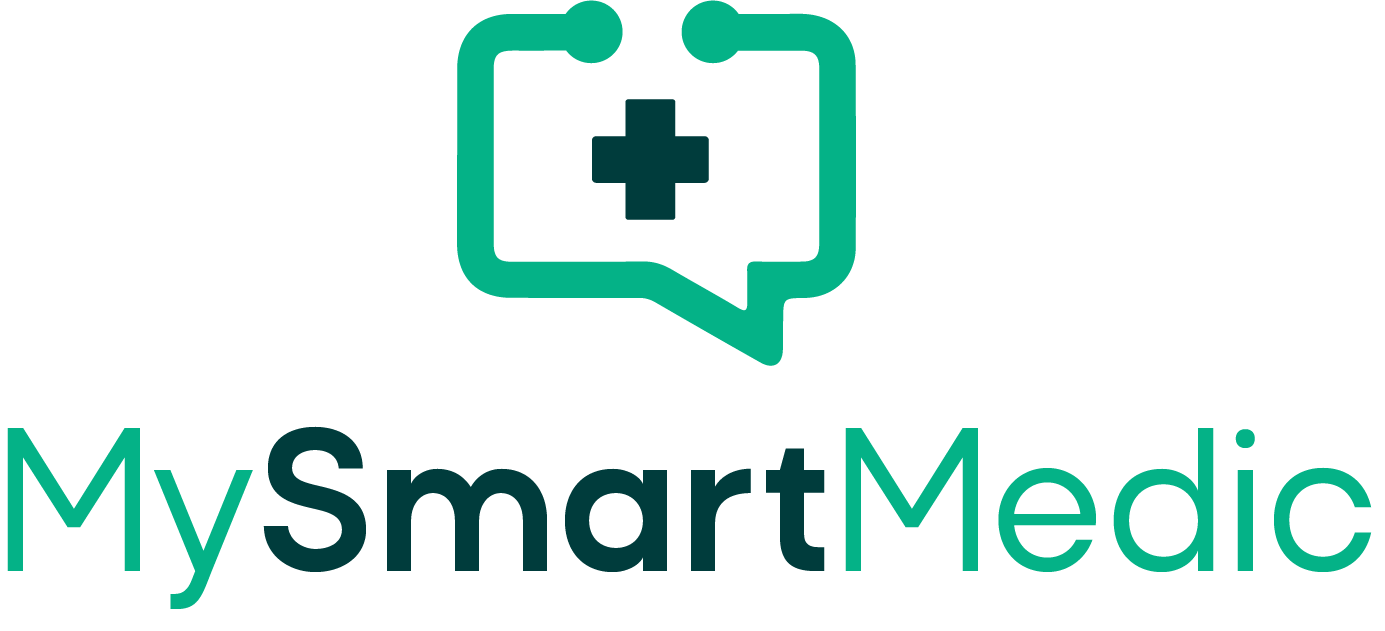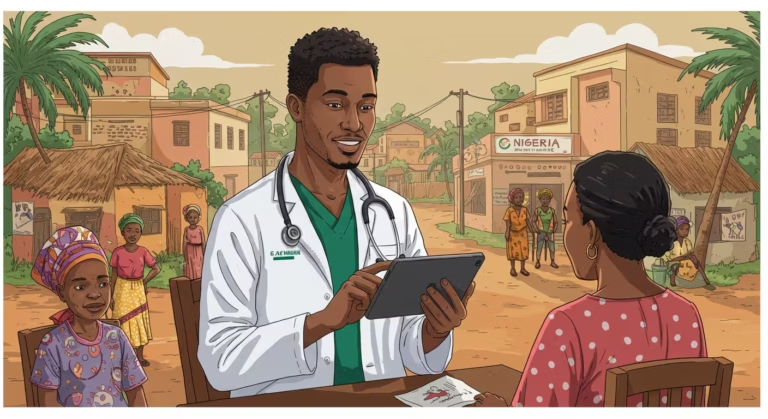Top 10 Telemedicine Myths vs Facts 2025
In this article, you will discover the top 10 telemedicine myths in Nigeria and the facts that debunk them. Don’t let misinformation stop you from accessing better healthcare.
A lot of Nigerians still don’t understand telemedicine despite the fast growth towards online healthcare.
Some think it’s just a passing trend. Others say it’s only for the rich. Many do not even trust it at all.
But here’s the truth. Telemedicine is not magic. It doesn’t replace hospitals. It is simply a way to make healthcare more accessible, especially for people who live far from clinics or cannot afford the time or cost of in-person visits.
Top 10 Myths About Telemedicine in Nigeria: Debunked with Facts
In this article, we will discuss some of the most common myths about telemedicine in Nigeria, and debunk them with real facts.
Myth #1: Telemedicine Is Only for the Rich
One of the first myths is that a lot of Nigerians still think telemedicine is something only wealthy people can afford.
It sounds high-tech, so people imagine you must have the latest iPhone or thousands of naira to spend before you can even talk to a doctor.
But that is not how it works.
Platforms like MySmartMedic offer affordable virtual consultations, often cheaper than in-clinic visits. We design our services for regular people including traders, students, artisans, and everyday families.
You can speak with a doctor for less than what you might spend on transport to the hospital, not to mention the extra charges when you get there.
MySmartMedic offers prepaid plans, bundle options, and even discounts for longer-term care packages. You don’t need fancy devices or a heavy budget. Just a basic smartphone and small data, and you are good to go.
And the best part? You get your care without stepping out of your home, standing in long lines, or missing a day’s work.
Myth #2: Online Doctors Are Not Qualified
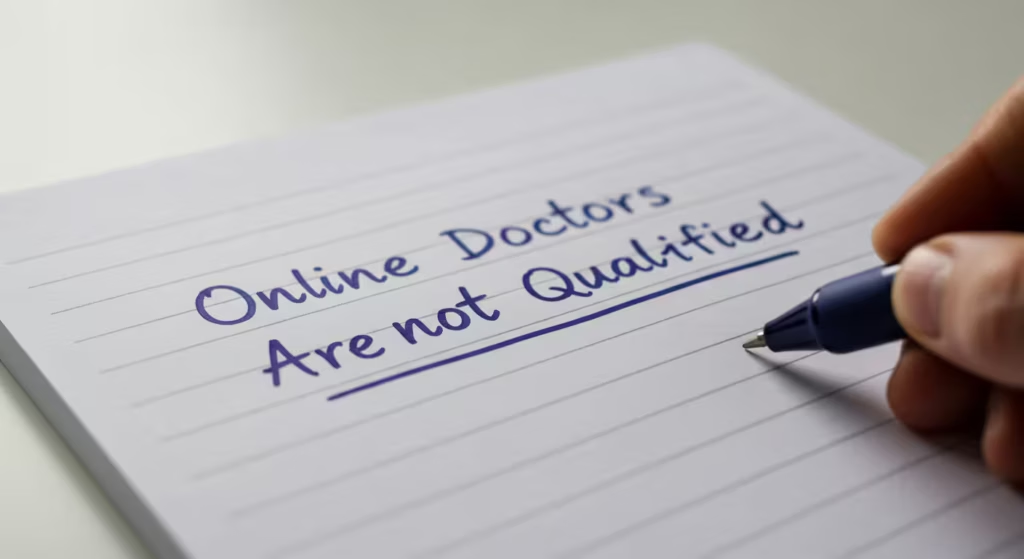
It is normal to be a little skeptical. If you are not walking into a clinic and sitting face-to-face with a doctor, how can you be sure they know what they are doing?
Nigerian telemedicine platforms must work with MDCN-certified doctors. Online doctors are the same professionals working in our hospitals and clinics.
MySmartMedic verifies every doctor on the platform and ensure they have their licenses before any virtual consultations.
You are not going to be talking to someone guessing their way through. These are real Nigerian doctors doing real Nigerian work, just through your screen.
And just like in-person doctors, they know when to refer you to a specialist or request further tests.
Myth #3: You Can’t Get Prescriptions Through Telemedicine
Another telemedicine myths is that some people believe that if a doctor is not physically writing on a prescription pad in front of you, then the medicine would not count. That is no longer true.
Today, online doctors can give you valid prescriptions, and many pharmacies across the country now accept them. When you consult through MySmartMedic, your doctor can send a digital prescription right after your session.
You can pick it up from a pharmacy or we deliver it if that option is available in your area. E-Prescriptions are legal.
This system also reduces the risk of losing your prescription slip or getting the wrong medication due to illegible handwriting.
It is a smarter, faster, and less stressful way to get the treatment you need, especially when you are not feeling well enough to leave your house.
Myth #4: It’s Not Secure or Private
This one comes up a lot and it is a serious concern for many. People want to know: “Will my medical details be safe?” With all the news about data leaks and online scams, who would not be worried?
But telemedicine providers in Nigeria are under strict rules when it comes to patient privacy. The Nigeria Data Protection Regulation (NDPR) is there to protect you and ensure your data stays confidential.
Digital health platforms like MySmartMedic follow these rules and use strong security systems to keep your information locked away.
Your medical chats, test results, and records are only seen by your doctor. Nobody else.
Also, MySmartMedic uses cloud-based systems with encrypted access. This means your information is protected, whether you are on a video call, chatting with a doctor, or receiving a prescription.
In short, your health records are treated with as much seriousness online as they would be in a hospital.
Myth #5: It Can’t Handle Serious Illnesses
Another myths is the belief that telemedicine is only useful for small issues like a cough or malaria. But that is far from the truth.
As a matter of fact, many people are using virtual care to manage serious and ongoing health conditions. For example, someone with high blood pressure does not need to rush to the hospital every week.
With regular check-ins on an app like MySmartMedic, they can monitor their symptoms, adjust medications, and stay on top of their condition; all from home.
Telemedicine supports long-term care for conditions like diabetes, asthma, anxiety, arthritis, and more. Patients can report symptoms regularly, share updates, and get timely adjustments to treatment plans.
It is also useful for mental health care, physiotherapy rehabilitation guidance, and post-surgery follow-ups. Instead of traveling far and wide for every minor review, patients can stay in close contact with their doctor through their phone.
Myth #6: You Need Fast, Expensive Internet
This myth has stopped many people in rural and low-income areas from even trying telemedicine. But let’s be real, how many Nigerians actually have 5G internet?
The good news is, you do not even need it. Many telemedicine platforms are designed to work with low bandwidth.
MySmartMedic runs smoothly on 2G and 3G connections and allows audio-only consultations when the live video option is not available on basic smartphones.
You do not need a laptop or Wi-Fi either. Your regular smartphone and a bit of data will do. You can choose between video, voice, or even chat-based consultations depending on your internet strength and preference.
Whether you are in Lagos, Jalingo, or a village in Sapele, you can still reach a doctor, even with a basic smartphone and slow internet.
Myth #7: It’s Not Legal in Nigeria
Another of the telemedicine myths is that it’s not legal in Nigeria. That the law does not recognize it.
Here’s the fact: telemedicine is legal and regulated in Nigeria.
It is governed by the National Health Act and must comply with the NDPR and other professional standards. Healthcare providers like MySmartMedic follow these rules strictly, and they only work with licensed doctors.
They also have terms and conditions, disclaimers, and reporting mechanisms in place. This means that patients are protected and there is a standard of care that must be maintained.
So yes, it is legal. And no, you are not breaking any laws by speaking with a doctor online.
Myth #8: Doctors Can’t Diagnose Without Seeing You Physically
Yes, some conditions require a physical exam or lab tests. But not everything does.
In reality, many health issues can be diagnosed based on symptoms and medical history. When you speak with a doctor on MySmartMedic, they will ask specific questions, check your previous health records, and guide you properly.
They might also ask for photos or videos where relevant, in cases like skin issues or swelling. If they think you need an in-person test, they will refer you immediately.
But for common conditions like malaria, skin infections, anxiety, or UTIs, a virtual consultation is usually more than enough.
The doctors are not guessing, they listen, observe, and apply medical expertise, just like in the hospital.
Myth #9: Telemedicine Is Only for Urban Areas
This is another big myths of telemedicine and a dangerous one. People living in rural or underserved areas assume telemedicine is out of reach.
But it is actually made for them, to ensure they get quality healthcare access. In places where clinics are far and doctors are few, telemedicine helps fill the gap.
Take MySmartMedic for example. They have made sure the app can work even in communities with slower internet.
They also support Pidgin English and local dialects like Hausa and Yoruba, so users can talk to doctors in the language they understand best.
Farmers, traders, and artisans across Nigeria are already using telemedicine to get care, without having to travel for hours.
This is not a sham. It is working and it is getting better every day.
Myth #10: It’s Just a COVID Trend
No doubt, telemedicine became more popular during the pandemic. But to say it is fading out? That is absolutely false.
What COVID did was open everyone’s eyes to how useful virtual healthcare can be, not just during emergencies, but for everyday health needs too.
Governments, private hospitals, and health tech companies are now investing in digital healthcare infrastructure.
And platforms like MySmartMedic are expanding their services, improving technology, and training more doctors.
Telemedicine is becoming part of the normal healthcare journey, not just an option during lockdowns. It saves time, reduces cost, and keeps hospitals less crowded.
How MySmartMedic Is Breaking These Telemedicine Myths Daily
Talk is cheap. But the real difference is in the lives being impacted every day.
Halima, a young mother in Kaduna whose son has bronchial asthma. She panics whenever her son has crises during the night.
One day, she found MySmartMedic while scrolling on Instagram. She registered on the app and now she uses it to manage her son’s asthma flare-ups.
Mr. Okon, a known diabetic patient who lives in Port Harcourt. He often forgets to take his medication regularly and misses his monthly appointments.
His friend introduced him to MySmartMedic and now he checks in with his virtual doctor monthly for diabetes care.
Tunde, a student of Unilag, struggles with anxiety and phobia. He didn’t know who to talk to and went searching online which led him to the MySmartMedic website. He now gets mental health support without the fear of being judged.
Furthermore, in more remote areas, MySmartMedic’s use of Omeife AI is closing the gap even further. This smart assistant can translate instructions and answer basic health questions in local languages, even in Pidgin.
It means more people understand what the doctor is saying, and fewer mistakes are made with medication or follow-up care.
Every successful consultation is one less delay in treatment. And every user is proof that healthcare does not have to be out of reach.
FAQs About Telemedicine Myths in Nigeria
Can I use MySmartMedic if I don’t speak English?
Yes. The app supports Pidgin, Hausa, Yoruba, and Igbo, so language is not a barrier.
What happens if I lose internet during a virtual consultation?
You can switch to audio, continue via chat, or resume the session later. Your doctor will still be there.
Are my medical records safe online?
Absolutely. Your records are protected using secure systems, and only your doctor can access them.
Can I use it for my parents or older relatives?
Yes. You can set up an account for them or help them during consultations.
Do I need to be tech-savvy?
Not at all. The app is user-friendly, with clear steps and support available if you get stuck.
Conclusion on Telemedicine Myths in Nigeria
At the end of the day, myths are just that: myths. And they only hold power when we believe them. Don’t let myths stop you from getting the care you deserve.
Telemedicine is helping to bridge the gap between patients and doctors in a country where access to healthcare is often limited by cost, distance, and time.
Platforms like MySmartMedic are proving every day that virtual care is not only possible but it is practical.
So if you have been holding back, it is time to rethink. Try a virtual consultation today. Ask questions. Take control of your health journey.
Because you deserve better, and better care is already in your hands literally.
Download MySmartMedic from Google Playstore or App Store. Your doctor is just a tap away.
